Many teens feel unsafe and anxious, but are positive about future - poll
- Published
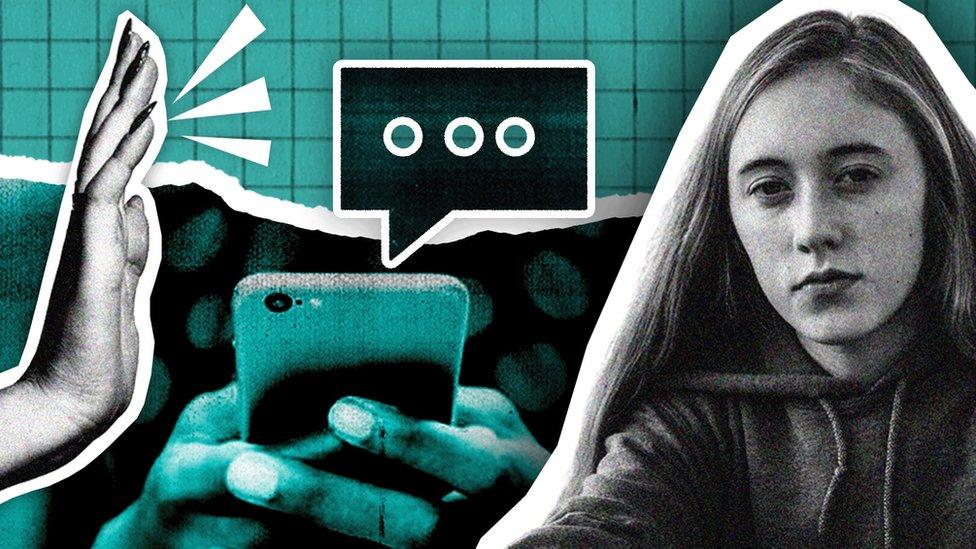
Many teenage girls say they experience sexual harassment in their day-to-day lives and do not feel safe on the street alone.
In a survey of 2,000 young people aged 13-18, more than a quarter of girls (27%) said they had experienced sexual harassment in some form.
Some 44% also said they do not feel safe while walking alone on the street.
The survey also asked teens about body image, anxiety, and vaping, and reveals concerns about online safety.
Polling company Survation conducted the survey for BBC Radio 5 Live and BBC Bitesize, external, in which 1,000 teenage boys and 1,000 girls were asked about their experiences.
The results suggest teenagers are concerned about the amount of pornography they see on social media. Almost a third who were surveyed had watched videos of controversial influencer Andrew Tate - and many said they had liked them. Hundreds of teenagers also said they feel anxious some or all of the time.

Since starting secondary school, 13-year-old Bobbie says she feels much less safe making her way home from school.
"It can be quite scary sometimes," Bobbie tells BBC Radio 5 Live. "Getting shouted at, people saying: 'You look good babes.' Sometimes it's people grabbing my arm in the street - I was once chased by people two or three times my age."
Princess, 14, says she has back-up routes worked out for her walk home from school - should she need to use them - and that she is "constantly checking" who is behind her.
Others say they have to be mindful of what clothes they are wearing when they go out.
"The way you look has a huge difference on what happens outside," says 15-year-old Sonia. "If I'm in a dress or wearing a crop-top and tight clothing, I'm not going to have a peaceful day."
Eighteen-year-old Rofeda worries that if she ignores or stands up to sexual harassment she might even be putting herself in danger.
"You don't want it to escalate to things you can't handle," agrees Kayla, 18.
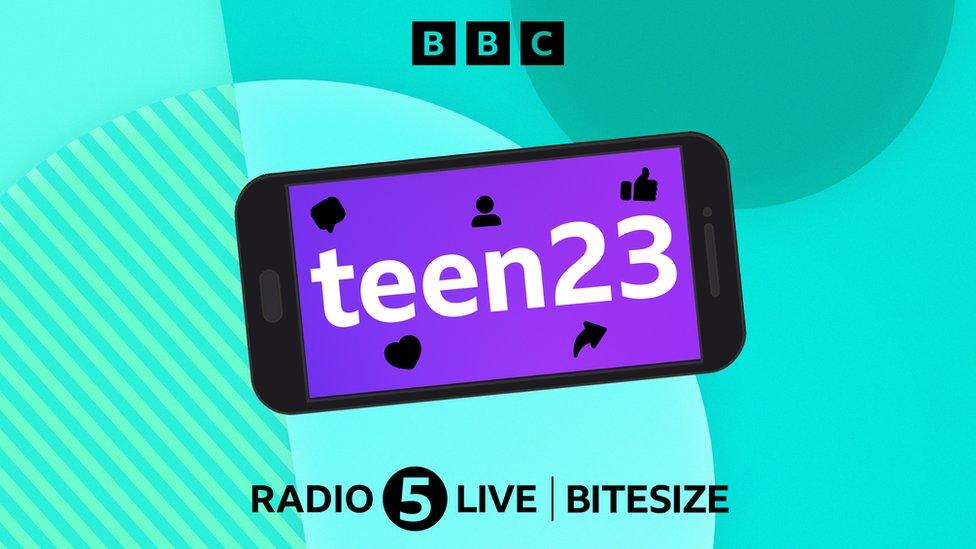
BBC Radio 5 Live is talking to teenagers about the challenges they face in 2023

While 44% of girls said they do not feel safe on the street, almost a quarter of teenage boys (24%) also said they felt this way.
"If there's a group of boys looking at me and I'm on my own and it's dark, I fear for my safety," says 15-year-old Ashley. "I worry about getting jumped - you see so many videos on social media about people being attacked and it makes you feel threatened."
More needs to be done to help educate people about why it is not OK to sexually harass others, according to Rosie, 16, from women's safety campaign, Our Streets Now.
"Telling them that it's a crime - it's not a compliment, it's not a flattering thing," she says, "this isn't something that should be yelled across the street for someone minding their own business."
Influencers
Teens also gave insights into the impact of online influencers.
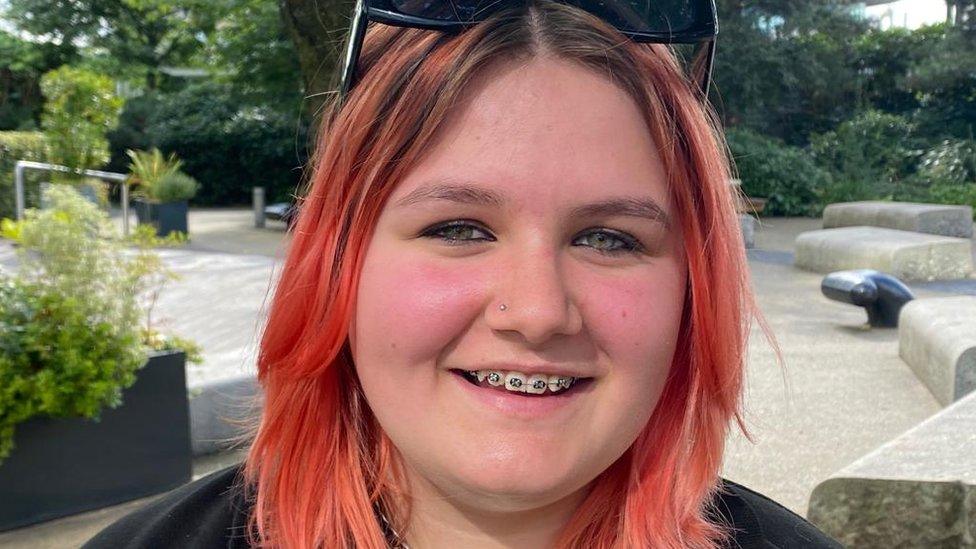
Izzy says you can learn a lot from social media, but it causes people to compare themselves to what they see online
More than a third of 1,000 responses from teenage boys reveal they have watched videos of Andrew Tate, the survey suggests.
Tate and his brother have been freed from house arrest in Romania pending trial on rape and human trafficking charges. They deny the charges.
Eddie, age 15, thinks many boys find Tate's ideology persuasive.
"The idea he's putting into people's heads [is] that women can stay at home, cook and clean, and boys can go out and make money, provide for the family," he says.
Despite the negative publicity that the self-proclaimed misogynist has attracted, Emily, 15, says Tate is still making an impact on teenage boys and "if anything, it's getting worse".
Of the 629 teenage boys and girls who said they had watched videos of Tate, 38% said they liked them.
Meanwhile, 58% of teenage girls polled said they follow influencers online, of which more than a third said influencers make them feel they need to change the way they look.
Izzy, 15, says that although she recognises a lot of content can be "fake", it can still "cause people to compare themselves". For Francesca, 15, pressure to "look like you're living a better life" on social media "can have a really negative impact".
Feeling anxious
More than a quarter of teenagers polled said they feel anxious all or most of the time, with exams, going to school and peer pressure being the top three reasons.
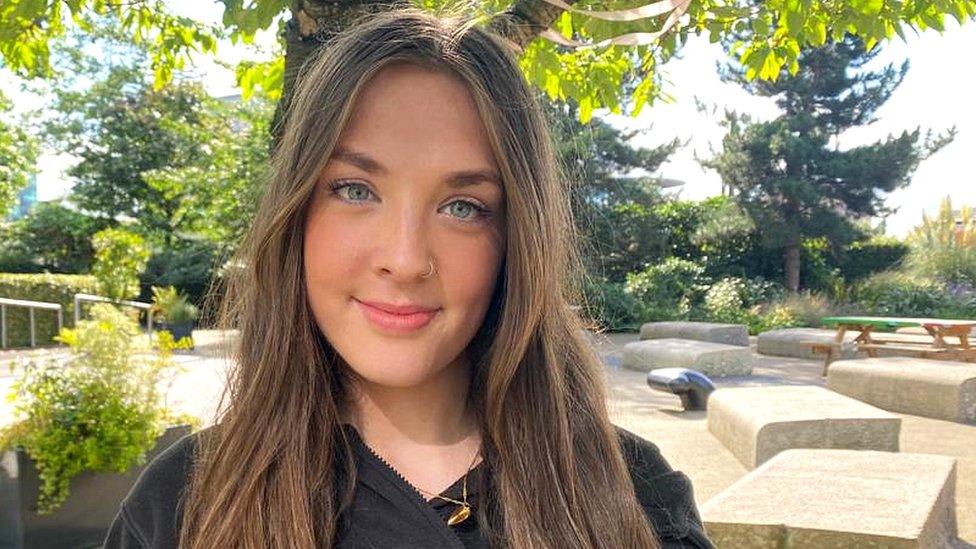
Francesca says it can be draining to see influencers posting about their "dream lives" every time she goes online
And more than half of male and female responses said they feel anxious when they don't have their phones with them - a third said comparing themselves to others on social media makes them anxious.
Teenager Kayla says it is tough not to be on there, because everyone else is.
"I've tried to not go on social media," she says, "but it's difficult because you feel like you're missing out on something."
Taking breaks from their phones for a couple of hours did help, some teens told the BBC. "Once I started having a life outside of my phone, with my friends, I feel like that changed a lot," says Emily, aged 15.
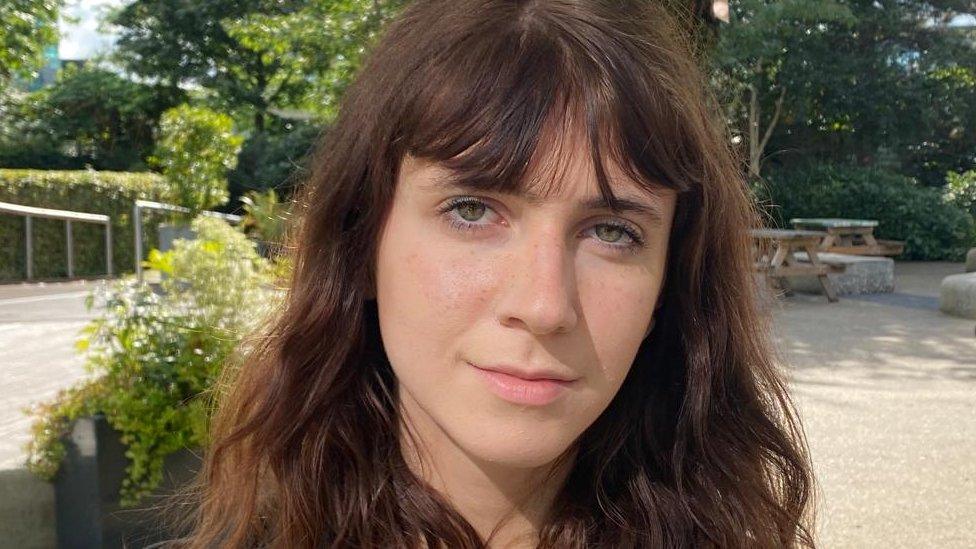
Emily says that taking breaks from her mobile phone has helped ease feelings of anxiety
A fifth of the 980 teenage girls who responded to the survey said they had received unwanted nude images or videos from a peer. While nearly three quarters of both male and female respondents said social media companies should do more to stop pornography being viewed accidentally online.
A government spokesperson said that "technology firms will be required to enforce their age limits and protect children from being exposed to harmful material online" through the Online Safety Bill which is due to become law this year.
Vaping
A third of teenagers surveyed said they had vaped at least once. Of the 641 responses who said they had, just over a quarter said they think they were addicted.
Seventy per cent of those who have vaped said they would be less likely to if the flavours were less appealing. Calls for bans on cheaper disposable vapes have been growing as more young people take up the habit, but exotic flavours with names like "unicorn" and "gummy bear" and brightly coloured e-cigarette packaging seem to be designed to directly appeal to younger people.
Officials in Westminster are actively looking for ways to reduce the numbers of people buying and using vapes.
"[Vapes] have dreadful, medical ramifications," Science Secretary Michelle Donelan says, "especially for bodies that are still developing."
Positivity
Responding to the survey, the Children's Commissioner for England, Dame Rachel de Souza, says urgent work needs to be done to protect children from online pornography and other harmful content, and that many of the findings echo things that children have also told her.
"In particular, it is clear that the online world and social media is having a very real impact on teenagers' mental health, their wellbeing, and their safety," Dame Rachel says.
For further help and advice for teenagers visit BBC Bitesize Study Support
A government spokesperson said all children deserve to grow up in a safe environment, and that schools should take immediate action against misogyny or harassment.
"We are considering what updated or additional guidance schools might need to support them in teaching about this issue as part of the ongoing, urgent review of the relationships, sex and health education statutory guidance."
Being a teenager can be tough and it's a period of lots of change, but it is not all doom and gloom.
In our survey, 66% of young people said they feel positive about the future, and the same number said family is the most important thing in their life right now.
Despite the cost-of-living crisis impacting young people, Fran says, "I still think we can have a good future."
If you have been affected by any of the issues raised in this article, there are details of organisations who may be able to offer help and support on the BBC Action Line website.

Sign up for our morning newsletter and get BBC News in your inbox.
